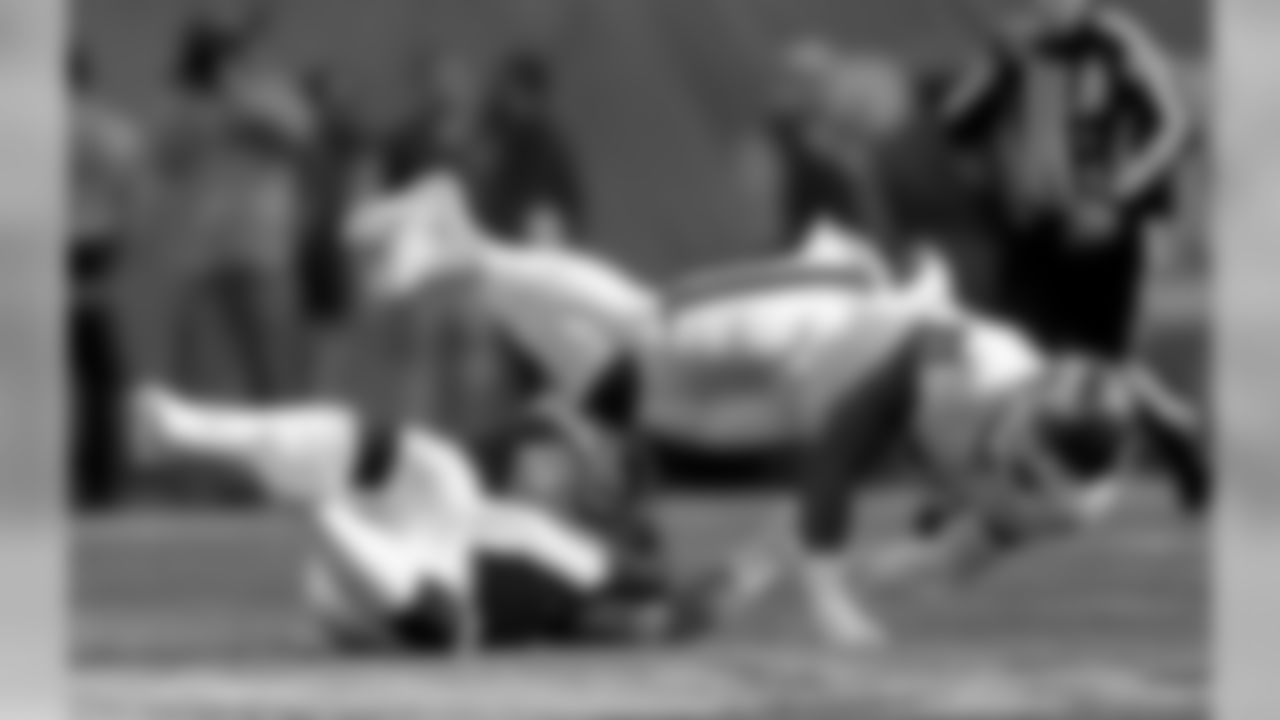Safety Landon Collins has lofty carer goals, even after two Pro Bowl nods and AP All-Pro honors:
In his three seasons at the University of Alabama, Landon Collins helped the Crimson Tide win a national championship, became a unanimous first-team All-America, and was the best safety in the country. He accomplished all that despite a pack-a-day habit that he kept secret from autocratic head coach Nick Saban and his assistants. Many of his Collins' friends and teammates knew, and they presumably wondered how he could play so well so consistently while indulging in a habit that was so obviously unhealthy.
"Yes, it's true," Collins said. "A pack every day. I would go to the grocery store every Monday and bought five packs, because it would last me throughout the week."
His vice wasn't cigarettes, but cookies. Because a standard package then had three rows of 15, or 45 in a pack, Collins was eating about 225 Oreos a week.
"But I wouldn't eat them on the weekends," Collins said.
That's still a lot of cookies. Collins insists his blood sugar levels were fine, and his weight never ballooned to the point where people though he was a guard.
"At Bama we ran every day," he said. "Practiced for at least two hours every day. So it was constant work, and the ones (starters) don't come off the field, so I was burning it almost as fast as I was eating it."
Collins no longer consumes cookies in mass quantities – "I watch my weight, and I pay attention to it more now'' – but he is still the best safety in whatever game he plays. Now, however, it is for the Giants.
A third-year pro, the 6-foot, 218-pound Collins started every game since his arrival as a second-round draft choice in 2015 until he was placed on injured reserve with a fractured forearm prior to the Giants 2017 season finale. The Giants so coveted him that in the 2015 draft, they sent the Tennessee Titans three draft choices to move up seven spots to the first selection in the second round so they could take Collins.
Collins left Alabama after a junior season in which he started all 14 games at strong safety and led the Tide with 103 tackles (60 solo), including 4.5 stops for losses of 15 yards. He arrived in the big city with lofty, it vague, goals.
"My expectation when I first came here was just to be the best safety I can be for the team," he said. "Be a contributor, and just play fast and play hard and work on my technique and being the best me I can be, and be the top dog I know I can be."
Collins demonstrated his ability and potential as a rookie in 2015, when he became the team's first defensive rookie to start every game since tackle Barry Cofield in 2006. Collins was the first Giants rookie safety to start every game. And he wasn't just running around out there; Collins led the Giants with 108 tackles (80 solo). He also had nine passes defensed, one interception, and four special teams tackles.
He did all that despite essentially playing out of position. A natural strong safety, Collins estimates he took 80% of his snaps at free safety that season.
"When I first got here, I was playing strong and it was really getting easier as practice went along, because they just had me playing one side and learning that part of the defense," Collins said. "Then when they switched me to free when all of our safeties got hurt, it was kind of like you have to learn strong and free, because we brought in two safeties (Brandon Meriweather and Craig Dahl), and one played strong and one played free. So I had to learn both, so they can be comfortable and they can play. After doing that everything was running in my head all over the place - where everybody is going to be and concept-wise, route reading-wise, and just trying to be a playmaker. It slowed my game down a lot."
In 2016, defensive coordinator Steve Spagnuolo told Collins he would played strong safety exclusively. Collins felt as if he'd been liberated.
"It freed me up," he said. "It slows the game down, because I know concept-wise what the other team likes to do from the strong safety side. I can see things faster. Everything just slowed down."
Collins was soon collecting honors for his outstanding play. As a strong safety, he was not only one of the NFL's best defensive players, but one of its finest players at any position. He led the team in tackles for the second consecutive season, with 125 (100 solo), the highest total ever by a Giants safety. Collins also had five interceptions, 4.0 sacks, and 13 passes defensed. He is the only player in NFL history to have 100 or more solo tackles, and at least 2.0 sacks, give interceptions, and 12 passes defensed. Collins was the first NFL safety with 100+ tackles, at least five interceptions, and at least 3.0 sacks since Rodney Harrison, then with San Diego, in 2000. He was the only NFL player in 2016 with at least five interceptions and at least 4.0 sacks.
Collins was named the NFC Defensive Player of the Week for his performances in Week 7 against the Rams in London (two interceptions, including one he returned for a touchdown, plus eight solo tackles), and in Week 9 vs. Philadelphia (12 tackles and an interception). Because the Giants had a bye in Week 8, was the franchise's first player to be named NFC Defensive Player of Week in consecutive games, the first player in the NFL to do it since Charles Tillman in 2012, and first safety since Troy Polamalu in 2010. At the time, Collins was the only NFL player to lead his team in tackles, sacks and interceptions. Collins was the first Giants player with at least four interceptions and 3.0 sacks in the same season since Jason Sehorn in 1996.
The awards continued when Collins was named the NFC Defensive Player of the Month in November, when, in four games, all Giants victories, he had 30 tackles (23 solo), including 1.0 sack, and three interceptions. Collins was the first Giants player to win an NFC Defensive Player of the Month Award since Jason Pierre-Paul in December 2011. He was the first Giants safety to be honored. The only other Giants defensive back to win the award was cornerback Sehorn in December 1997.
With Collins as a catalyst, the Giants were second in the NFL with 284 points allowed, one season after they were ranked 30th after giving up 442 points, the second-highest total in franchise history. The Giants allowed 17.8 points per game, the lowest average by their opponents since 2002, when they gave up 17.4 points a game.
After the season, Collins was named first-team All-Pro by the Associated Press and a starter on the NFC Pro Bowl team. Collins and defensive tackle Damon Harrison were the first Giants selected first-team All-Pro since defensive end Pierre-Paul in 2011, and Collins was the first Giants safety to play in the Pro Bowl since Antrel Rolle in 2013.
"Going into my second year, I did not know I was going to get all of the accolades that I was going to get, and make all the plays I was going to make," he said. "I knew the defense and I followed the system, and all of the blessing came to me after that."
Collins has not let success alter his determination to continue developing as a player.
"My attitude is the same," he said. "It's improve on whatever I need to improve on. After last year, I needed to improve on pass and run concepts. Sometimes when you're strong safety, you are kind of playing more in the box and within the run defense, but you don't want to get hit with a pass over your head. That's the biggest things for strong safeties and that's what I'm trying to work on, just trying to get better and things like that. So when I am needed, I can be there as quick as possible."
One honor Collins did not receive in 2016 was the AP Defensive Player of the Year Award, which went to Oakland Raiders linebacker Khalil Mack. Collins finished third, behind Mack and Denver's Von Miller, but insists he wasn't disappointed by the results.
"I had a good group of guys in front of me," he said. "I was just more honored to be in the running with them. With Von, with Khalil Mack, with a couple more guys - Vic Beasley, all those guys I am honored to be in the running with. J.J. Watt. It's just an honor, because those are big-name guys, and those guys have been in the league for four-five years. It was my second year in the league and I'm up there being in the conversation with them being one of the best players on the defensive side. So it was big."
Collins wants nothing more than to add a Super Bowl victory to his Crimson Tide championship. But while he pursues that title, he wouldn't mind being the Defensive POY.
"When I found out the award was available, it became a goal of mine," Collins said. "I'll definitely keep working toward that goal. Offenses kind of stay away from me. Matthew (Stafford) took a shot at me, didn't get it. I always got to stay on my P's and Q's and stay focused, and just don't think that because I was noticed as one of the best, none of the best quarterbacks are going to still try me. So, when they do I got to make it count."
Quarterbacks can more easily minimize a cornerback's impact by not throwing to his side. A safety is harder to avoid. And Collins is particularly difficult to circumvent, because, he said, he can lineup wherever he chooses.
"It's harder to avoid a safety, because sometimes I can line up strong (side), sometimes I can line up weak," Collins said. "It's kind of my discretion on how I feel concept-wise, and how I see what I think they are going to do, and play within the defense. If I feel like something is going to happen to the strong side, I can sometimes lineup to the strong side. If I feel like something is going to happen to the weak side, I can line up to the weak side. It's harder to throw away from a safety. But I know the quarterback is always looking to see where the safety is at."
Collins prides himself on his versatility. He can come up and tackle a running back for a loss, sack a quarterback, cover a tight end, and drop deep and intercept a long pass. And while Collins is not ready to tout himself as the NFL's most versatile defender, he knows he belongs in the conversation.
"I can do a lot of things, but I wouldn't say I am the most versatile," he said. "There are a lot of DB's out there that have a lot of versatility, too. You got (Arizona's) Tyrann Mathieu, you have me, you have (San Francisco's) Eric (Reid, his former high school teammate), you have (Seattle's) Earl (Thomas) and Kam (Chancellor). I mean all of us play different positions, we all can do different things. I am definitely up there in the top three categories with those guys, and doing different things and understanding what I need to do, where I am at and what position I am at, and route concept-wise and what is going on in front of me, plus the run. Knowing all of those things and having all of those things going on in your head within 10 seconds is big, and still playing fast and making plays is big. So yeah, I definitely feel like I am one of the top guys."
Collins is a bit of safety connoisseur who enjoys analyzing the other players at his position.
"I study Earl, I study Eric, I study Kam, I study (Green Bay's) Ha Ha Clinton-Dix, and I study Eric Weddle. I study all of those guys because, obviously Eric is a free safety, but he's smart. He can play in the box too. Earl has that quick trigger. I talk to Earl and ask him, 'What do you see?' And he said route recognition, and that's where I got it from last year. Sometimes you can pick up key things from route recognition. Ha Ha and me are on the same page. We played together (at Alabama). He knows how to confuse the quarterback. His disguises are amazing. He's all over the field, but always in the right position. Kam, he plays more in the box, and he can read the run and then buzz out to the flat. You don't even see him coming when he comes in with a big hit. Stuff like that, it's big. I look up to all those safeties."
Collins' closest friend in the NFL is Clinton-Dix. Some weeks, they will talk four or five times.
"Most of the time it is personal," he said. "Secondly, it's professional. The other day he was just talking about football, and how we are playing and checking up on each other. And then thirdly, we were talking about how we are doing. How is your body feeling and just how is life and stuff like that? We keep up with each other definitely. We're always tweeting each other, it's crazy."
In addition to being an outstanding player, Collins is a quiet leader who is willing to speak to the media during bad times as well as good. As a rookie he dropped what would have been a game-clinching interception in what became a last-second loss to New England. But he stood at his locker and answered every question, never once making an excuse.
"It's very important to me to be accountable, to be responsible for what you have to do, and learn from it," Collins said. "It's big. I harp on it. If you're accountable, you're doing the right thing, you're doing what you need to be doing and getting the job done. If you're not accountable, you're always second guessing. I know the kind of player I am and the kind of player I want to be, and what I am trying to achieve. If I see somebody next to me, and they say they want these goals, but they are not trying to achieve them, you're not being accountable for everything you're doing. I just can't stand it. It really eats at me."
Collins grew up in New Orleans' Seventh Ward, the second-oldest of nine children, and the oldest boy. As a youngster he played football at Hunters Field, which was situated under a bridge that was part of Interstate Route 10.
"There was a weight limit on what squads you had to be on," said Collins, who was then a running back. "We moved up a weight class every other year. We played on one squad for two years. I had the same kids around me, because we all moved up at the same time. It was good. I won five championships there, and I was MVP three times out of the five."
When Collins was 11, Hurricane Katrina devastated New Orleans, and his family evacuated. At one point, perhaps 25 family members lived in his uncle's house on Sicily Island, which had one bathroom.
"Water got cold, so we had to take a cold bath – that sucked," Collins said. "The girls hogged the bathroom, because they had to do their makeup and their hair. It was fun because you had your family out there. You knew people. You weren't alone. But after Katrina hit, we couldn't go back home. We had to go to school out there. They looked at us like we were rejects. Like we didn't belong there."
Collins eventually enrolled at Dutchtown High School in Geismar, near his father's house in Baton Rouge. He thought he would continue his career as a running back, until he discovered that Eddie Lacy was on the team. Lacy has rushed for more than 3,400 yards and 23 touchdowns with the Green Bay Packers and Seattle Seahawk. So Collins switched positions, outing him on a straight path toward the NFL.
"I started playing safety when I went to Dutchtown," he said. "I played corner when I got there to high school. Because Eddie Lacy was there I couldn't play running back, because I wasn't really going to touch the ball. So, I said, 'Cool, I'll just go play defense.' They put me at corner, I played really good at corner. Then I put some size on and they moved me to safety."
He's been there ever since. As a sophomore he played alongside Reid, who has started every game in which he's played for the 49ers since they selected him on the first round of the 2013 NFL Draft.
"I played strong safety and he played free," Collins said. "He was faster than everyone. He could go get more balls."
As a junior, Collins remained at safety but also returned to his routes by lining up at running back after Lacy's departure to play for the Crimson Tide.
"We had some talented running backs, but they weren't up to par," Collins said. "They were still young. Coach always remembered that when I got there I was a running back and they let me touch the ball a few times. The first time I touched the ball I think I gained 30 yards, and then the next one I scored. So, they were like, 'Alright, we got our guy. Just call the play and he will go get it.'"
By then, Collins had become a highly-recruited player. But he considered just two schools: Alabama ("they were winning championships," Collins said) and LSU ("that was my hometown team)." His mom publicly stated she wanted him to attend LSU, but Collins chose Saban's Crimson Tide. "She asked me, 'Are you sure you want to go to Alabama?'" Collin said. "I said, 'Yes, mom, it's the best choice for me, and our family, and for us to exceed my limitations and make it to the pros.'"
In his freshman year, Alabama defeated Notre Dame in the national championship game.
"That was amazing," Collins said. "That team was fantastic. The guys I played with were on another level. I had to match their level. Just matching their level made me a better player and made me accountable. It made me the player I am today."
And that is very possibly the NFL's best safety. It is a title – and a job – Collins intends to keep for a long time.
"They are going to have to drag me off the field." He said. "They are going to have to say, 'Landon, we are going to have to go a different way.' They are going to have to make me retire or something like that. I love this game that much. My long-term goal is (to play) 15 years. My short-term goal is 12-13 years. That is my goal. I want to retire as a Giant. This is where I want to finish."
Photos of safety Landon Collins in action during the 2017 season


































